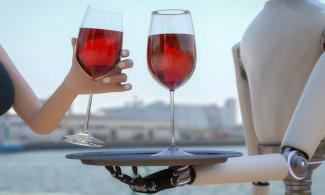By January, ChatGPT had already clocked up over 100 million users.
For many, artificial intelligence is the next big step in computerisation, but it also raises the question of how work will be distributed between humans and machines in the future. Until now, robots performed routine tasks that required no consideration. Now, the latest version of the bot has passed three levels of the Master Sommelier exam.
Now the technology that uses information culled from across the internet to answer difficult questions and hold discussions with users is being integrated into Microsoft's Bing search engine and new versions are constantly being launched: the latest is GPT-4. Initially, those wanting to try the bot out had to join a long waiting list, but recently access has been opened to Edge users.
And it now faces stiff competition from other AI bots such as Google's Bard.
The speed at which the technology has emerged and is evolving has fascinated many observers who wonder what it will and will not be able to do. One area that has particularly attracted attention is its use to write high quality essays by students at various levels of the education system. Proof of its ability to do this was offered recently when GPT-4 was challenged to answer questions from the US Law School Admission Test (LSAT) and Court of Master Sommeliers exams.
Mastering sommelier exams
The bot performed well. Very well. GPT-4 scored 163 in the LSAT exam, enough to get into the top 20 law schools in the US - though not quite sufficient for Harvard, Princeton, Stanford or Yale. Illustrating the momentum behind the AI improvenent, OpenAi reported that, while the newest iteration of ChatGPT was in the top 10% of test takers, its predecessor, GPT-3.5 was in the bottom 10%.
When it came to wine, the bot scored 92% in the Court of Master Sommeliers introductory paper, 86% in the Certified Sommelier exam and 77% in the Advanced Sommelier paper, answering questions such as
- What is Torcolato, where is it made?
- What is Grand Vidure?
- What is Eutypa Dieback?
- Where is the Wahluke slope located?
And the Master of Wine?
Meininger's spoke to Julian Gore-Booth, Executive Director of The Institute of Masters of Wine (IMW):
"ChatGPT (and other AI platforms) have been on the IMW’s radar for a while now and we are actively exploring whether it poses any risk to the Master of Wine programme. Depending on how you phrase the questions you ask, it is apparent that ChatGPT can do a convincing theory essay, but the MW is a broad qualification that demands much more than this from students at multiple stages on the study and assessment pathway,” he said.
"The MW is a broad qualification that demands much more than this from students at multiple stages on the study and assessment pathway."
“The concern is real and all educational establishments that use written assessment need to take note of developments in AI. However we are in quite a good position, and particularly when compared to the assessment model used by many educational institutions,” Gore-Booth continued.
In view of the superior results, it might be tempting for students to rely on ChatGPT to get better results. To prevent this, IMW exams are held in strict conditions: and as Gore-Booth explains, "the exam software that we use prevents candidates accessing the internet during exams, and candidates do not have access to their mobile phones or smart watches whilst sitting the exam. ”
And it will not stop there. AI can now be policed by AI. "Turnitin (our anti-plagiarism software) believes they are not far away from being able to recognise AI-generated writing," says Julian Gore-Booth.
Not so practical
For the moment ChatGPT is not able to attempt the tricky blind tastings associated with Master Sommelier and Master of Wine qualifications, but it would be a brave person who'd say that it will never develop these capabilities.







